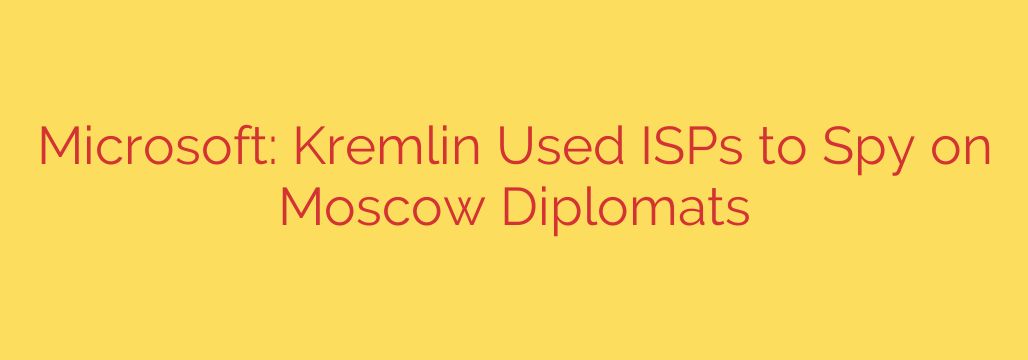
Kremlin-Backed Hackers Weaponize Home Wi-Fi to Spy on Foreign Diplomats
In a significant evolution of cyber espionage tactics, a sophisticated Russian state-sponsored hacking group is now targeting the home internet connections of foreign diplomats to breach sensitive government and corporate networks. This new method represents a dangerous shift, moving the front lines of digital warfare from heavily fortified government servers to the seemingly safe confines of residential homes.
At the heart of this campaign is Midnight Blizzard, the threat actor group also widely known as Nobelium or APT29. This is the same elite unit linked to the infamous 2020 SolarWinds supply chain attack, demonstrating their high level of skill and determination. Their latest operations focus on compromising foreign embassies located in Moscow by first infiltrating the personal networks of their employees.
The New Espionage Playbook: Targeting Home Networks
The strategy is both simple and brilliant: instead of launching a direct assault on a well-defended embassy network, the attackers target a weaker link in the security chain—the employee’s home. By gaining control of an individual’s residential Wi-Fi, often through insecure Small Office/Home Office (SOHO) routers, the hackers can launch attacks that appear to originate from a legitimate, trusted location.
This approach offers several advantages to the attackers:
- Stealth: Malicious traffic originating from a diplomat’s home IP address is far less likely to trigger alarms than traffic from a known hostile server.
- Persistence: A compromised home router can provide a long-term, persistent foothold for surveillance and future attacks.
- Bypassing Defenses: It effectively circumvents many of the perimeter security measures, like firewalls and gateways, designed to protect an organization’s official network.
Unpacking the Attack: How Midnight Blizzard Infiltrates Networks
The attack chain reveals a multi-stage process designed for maximum impact. According to security researchers, the operation typically unfolds as follows:
- Initial Access: The attackers gain control over a target’s home router or internet connection.
- Phishing and Malware Delivery: From this trusted position, they target the diplomat with phishing links or forum posts that trick the user into executing malicious code.
- Backdoor Deployment: Once a user clicks the link, a custom backdoor malware, identified as “GooseEgg,” is installed on their machine.
- Exploiting Vulnerabilities: GooseEgg is designed to exploit a known Windows vulnerability (tracked as CVE-2022-38028) to gain elevated system privileges.
- Credential Theft and Lateral Movement: With elevated access, the attackers steal credentials and use them to move laterally from the diplomat’s computer into the highly sensitive embassy network.
This campaign has successfully targeted diplomatic missions from multiple NATO countries as well as other nations, highlighting the broad scope of this intelligence-gathering effort. The primary goal is clear: to steal sensitive credentials that unlock access to state secrets and confidential government communications.
Actionable Security Measures to Defend Against These Threats
The blurring line between home and office networks means that personal cybersecurity is now a matter of national security. Whether you are a diplomat, a corporate executive, or a remote employee, these steps are crucial for defending against sophisticated threats.
- Secure Your Home Router: This is the most critical step. Immediately change the default administrator password on your router and ensure its firmware is always updated to the latest version. Disable remote management features unless absolutely necessary.
- Practice Vigilant Phishing Awareness: Never click on suspicious links or download attachments from unverified sources, even if they appear to come from a familiar forum or contact.
- Keep All Systems Patched: Ensure your operating system and all software are regularly updated. The GooseEgg malware specifically exploited a vulnerability that had a patch available. Timely updates are your first line of defense.
- Use a Trusted VPN: A Virtual Private Network (VPN) encrypts your internet traffic, providing a secure tunnel that can protect your data even if your local network is compromised.
- Enable Multi-Factor Authentication (MFA): MFA adds a powerful layer of security that can prevent stolen credentials from being used to access your accounts. Enable it on all critical work and personal accounts.
- For Organizations: Promote network segmentation to prevent an intruder from moving easily between less sensitive and more critical parts of your network.
This campaign is a stark reminder that the cyber threat landscape is constantly evolving. As attackers devise more creative ways to bypass traditional defenses, individuals and organizations must adopt a proactive and layered security posture to stay one step ahead.
Source: https://go.theregister.com/feed/www.theregister.com/2025/07/31/kremlin_goons_caught_abusing_isps/








